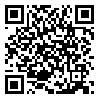Volume 19, Issue 21 (9-2021)
RSMT 2021, 19(21): 37-54 |
Back to browse issues page
Download citation:
BibTeX | RIS | EndNote | Medlars | ProCite | Reference Manager | RefWorks
Send citation to:



BibTeX | RIS | EndNote | Medlars | ProCite | Reference Manager | RefWorks
Send citation to:
Shirzad E. A new model for talent identification in karate based on artificial intelligence algorithms. RSMT 2021; 19 (21) :37-54
URL: http://jsmt.khu.ac.ir/article-1-306-en.html
URL: http://jsmt.khu.ac.ir/article-1-306-en.html
Abstract: (8178 Views)
Despite the importance of talent for sports, but it has yet received little attention. The purpose of this study was to present a pattern design for talent identification in karate based on artificial intelligence algorithms. Subjects divided to adolescent elite karate athletes (n = 19) and non-karate athletes adolescent (n=20) by convenience sampling. Besed on previous literature, we selected and measured biomechanical and anthropometric variables. The normal distribution of all data was analyzed using Shapiro-Wilk test. Principal component Analysis (PCA) was performed to reduce the number of variables and identify the most important anthropometric and biomechanical variables. Then, for modeling, the neural network algorithm was used with three input layer (10 neurons), middle (7 neurons) and output (2 neurons). The results showed the most important anthropometric variables of adolescent elite karate athletes were thoracic subcutaneous fat, height, jump, static balance, grip strength, chest circumference, ankle circumference, abdominal subcutaneous fat and apparent length leg respectively. Also, percentage of correct classification and sensitive of data was high and 87% and 85% respectively. According to the results of this study, this method can be used for talent karate athletes along with other methods.
Type of Study: Research |
Received: 2019/04/7 | Accepted: 2021/09/20 | Published: 2021/09/20
Received: 2019/04/7 | Accepted: 2021/09/20 | Published: 2021/09/20
| Rights and permissions | |
 |
This work is licensed under a Creative Commons Attribution-NonCommercial 4.0 International License. |







